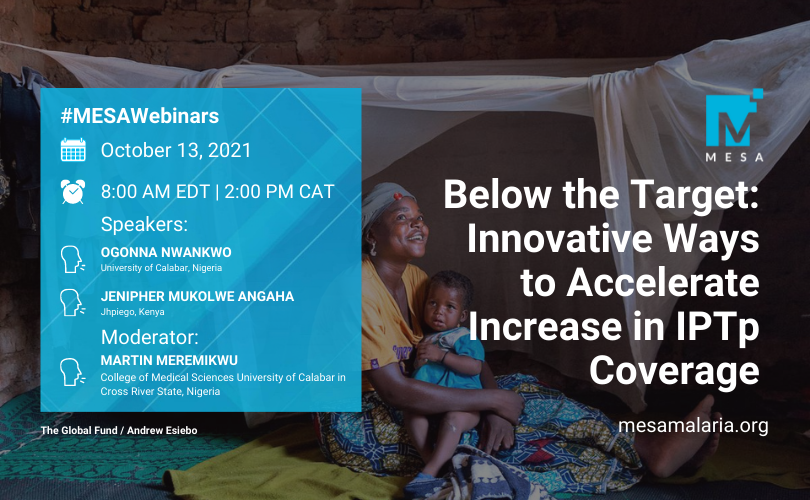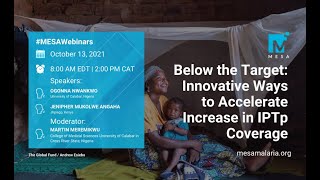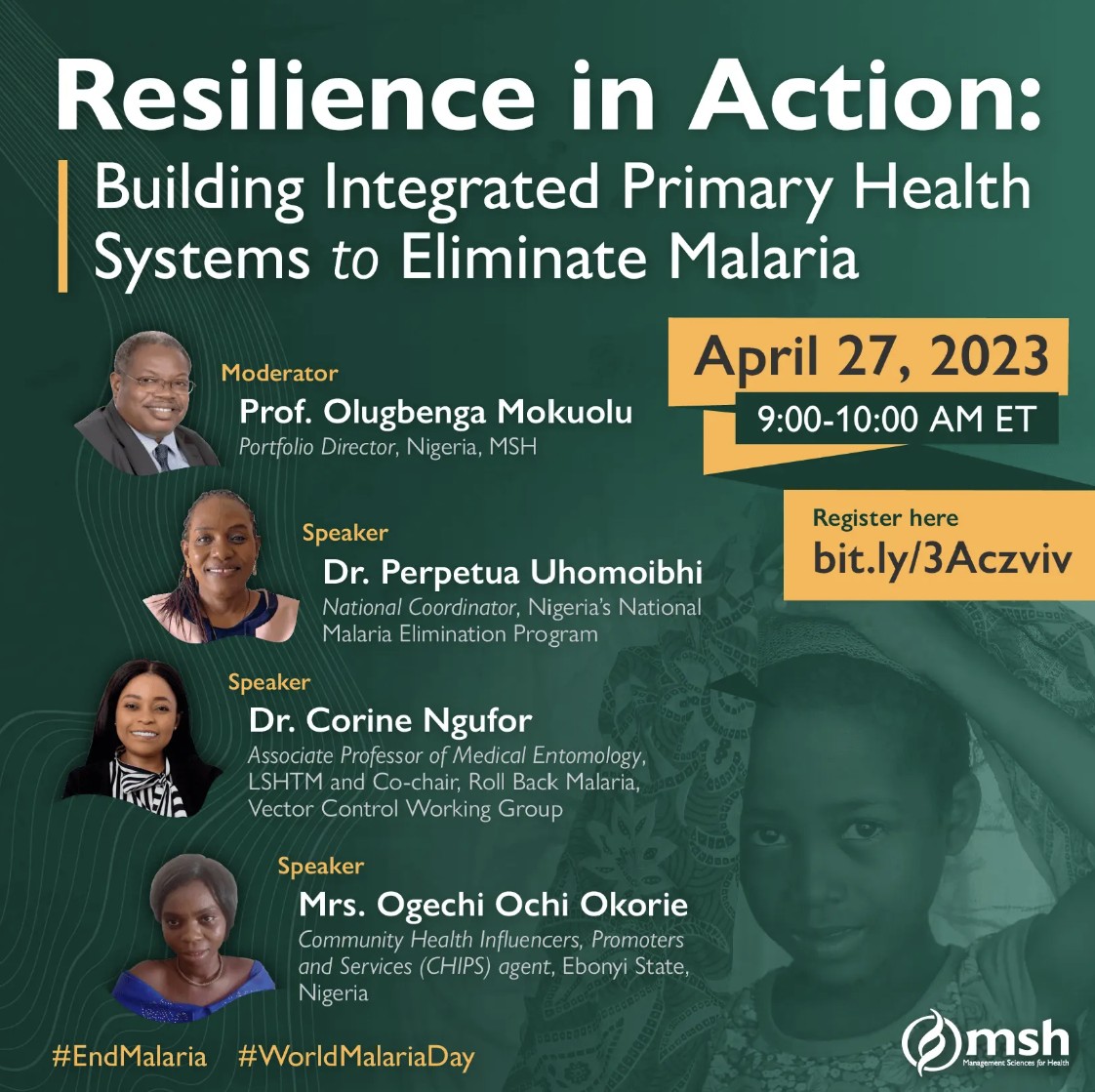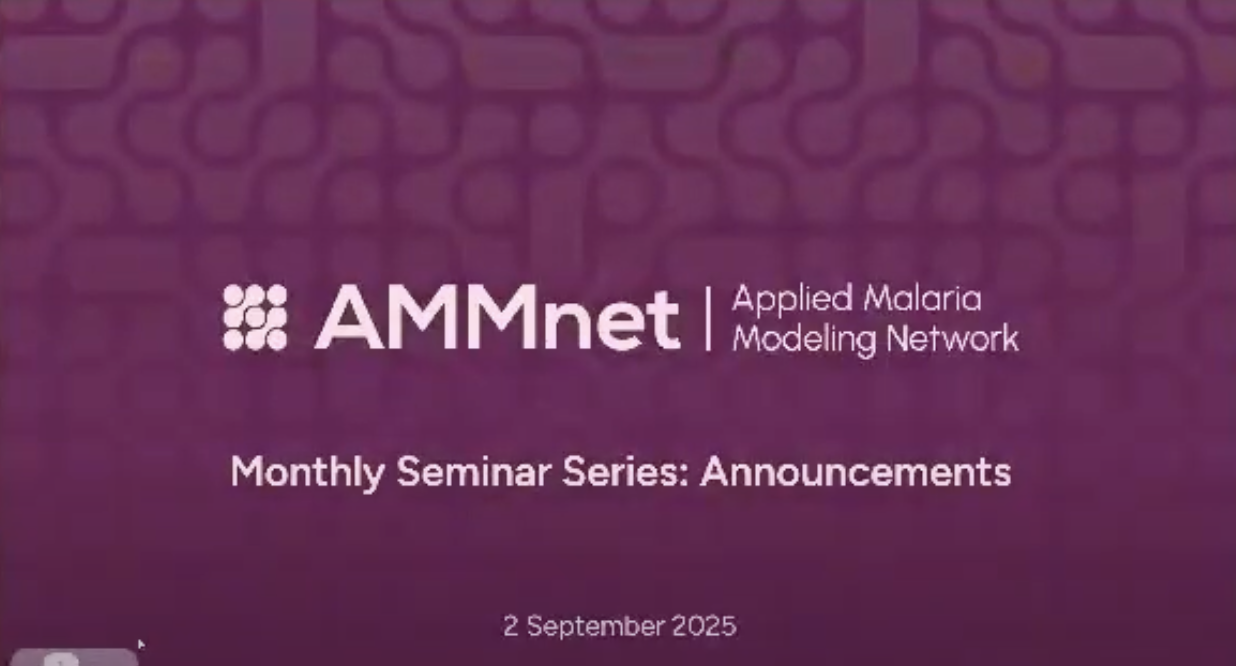MESA Webinar 5 – Below the target: Innovative ways to accelerate increase in IPTp coverage
Published: 21/10/2021
This report is brought to you by the MESA Correspondents Nkemngo Francis Nongley, Vita Mithi, Faith Hungwe, and Ana Alonso.
THEMES: THEMES: Vulnerable Populations
MESA Correspondents bring you the coverage from the MESA Webinar 5 – Below the target: Innovative ways to accelerate increase in IPTp coverage
Wednesday, October 13th, 2021
Opening Remarks
The 5th MESA webinar on Science for Malaria Impact was presided by Regina Rabinovich who welcomed everyone and highlighted MESA’s objective of providing a platform to echo the voice of researchers in malaria-endemic countries and share their work with the global community. Furthermore, she introduced the moderator of the session, Martin Meremikwu (Tenured Professor of Pediatrics and Child Health, College of Medical Sciences, University of Calabar, Nigeria) who in turn profiled the speakers: Ogonna Nwankwo and Jenipher Mukolwe Angaha.
Evaluating the use of laypersons in community delivery of malaria intermittent preventive treatment in pregnancy (C-IPTp) in Nigeria.
Ogonna Nwankwo (University of Calabar, Nigeria) commenced by presenting an overview of the burden of malaria in pregnancy (MiP), known to account for about 10,000 and 200,000 deaths of pregnant women and neonates respectively. The strategy of intermittent preventive treatment for pregnant women (IPTp) through the administration of sulfadoxine-pyrimethamine (SP) during each antenatal visit has contributed enormously to preventing the severity and complications of MIP. Despite the benefits of this intervention, in areas of high malaria endemicity, there is increasing evidence of its low coverage in spite of high ANC attendance. In order to promote IPTp uptake by pregnant mothers, laypersons were utilized to pilot a transformative community delivery of Intermittent Preventive Treatment for Optimal Pregnancy (TIPTOP). The TIPTOP project was conducted in four countries (Nigeria, DRC, Mozambique and Madagascar) focusing on three subnational areas in each of the countries with low IPTp coverage. Using a socio-anthropological approach, the study assessed the acceptability of community-IPTp and identified the barriers and opportunities for IPTp uptake. Longitudinal field work surveys centered on focus group discussions and in-depth interviews with pregnant women, community leaders and traditional birth attendants, revealed that social interactions from the individual to the organizational level played key roles in influencing the uptake or denial of SP at the ANC or the community. The barriers and opportunities for SP uptake and adherence were attributed to perceived efficacy of the treatment in comparison to traditional herbs and perceived social acceptance of the drug considering the side effects. Also, perceived efficacy of the treatment for the unborn child, husbands’ approval, improvement in access to SP, as well as mistrust of community health workers delivery capacity of SP were seen as roadblocks to optimising gains of this strategy. Despite these concerns, a wide acceptance of community delivery of IPTp by beneficiaries was reported. Overcoming these IPTp barriers must focus on addressing the concerns on SP safety, engaging key community stakeholders, and prioritizing incentives for community health workers (CHWs) to ensure sustainability of the program.
Effect of group antenatal care versus individual antenatal care on intermittent preventive treatment of malaria in pregnancy and antenatal care attendance: a cluster-randomized controlled trial in Nigeria and Kenya
Jenipher Angaha (Jhpiego, Kenya) commenced by highlighting the challenge faced by midwives in conducting proper group antenatal care (G-ANC) visits because limited time is allocated to a lot of women who visit the health centres. This spurs a long waiting time for the pregnant women and enormous workload for the nurse leading to a low quality of ANC care that impacts maternal and child health. This group ANC practice is based on a service delivery model that incorporates a facility-based intervention system requiring a group of 8-12 women visiting the clinic in the early morning periods. This approach is structured such that at ANC, a woman is offered the option to join a cohort of pregnant mothers where she is assigned a group based on gestational age. These groups of women attend meetings in the health facility following a G-ANC framework with specific contents on national guidelines for IPTp recommendations. This pilot study was done to assess the impact of G-ANC on the uptake of malaria in pregnancy interventions such as IPTp with SP and the effective use of insecticide-treated nets (ITNs) for mothers and neonates. Moreover, the project assessed the G-ANC effect on diagnosis of MiP. Selected health facilities in this study had two to three ANC providers with sufficient ANC caseload and updated ANC clinical files. In the intervention and control facilities, service providers were trained on family planning and birth control methods whereas, in the intervention facilities only, G-ANC facilitators had undergone a 5-day training to start enrollment and ANC meetings. More so, monitoring and supervising the intake of SP and stock supplies of the treatment was performed at the intervention facilities by the service providers. The results demonstrated a higher mean number of IPTp doses in the intervention arm as compared to the control arm in Nigeria and Kenya. Furthermore, the analysis of ITN used on previous night at 3 – 6 weeks after birth revealed a significant difference in malaria incidence for infants between the G-ANC and control arm in Nigeria only. In conclusion, G-ANC delivers a higher-quality, high-value care that strengthens engagement with the health system.
Closing remarks
Martin Meremikwu congratulated the speakers for the lucid presentation and relevant research work. He opened the stage for questions-and-answers, where the presenters responded to the various questions asked by the audience. Furthermore, Regina Rabinovich congratulated the speakers for the wonderful talks and discussion and thanked the attendees for their participation. Finally, she expressed gratitude to the moderator and announced the next webinar session to be held in November.
This report is brought to you by the MESA Correspondent Nkemngo Francis (Centre for Research in Infectious Diseases – CRID, Yaoundé and University of Buea, Buea, Cameroon). Senior editorial support has been facilitated by Adelaida Sarukhan (Barcelona Institute for Global Health – ISGlobal, Spain).
Published: 21/10/2021
This report is brought to you by the MESA Correspondents Nkemngo Francis Nongley, Vita Mithi, Faith Hungwe, and Ana Alonso.
THEMES: Vulnerable Populations



